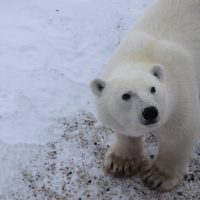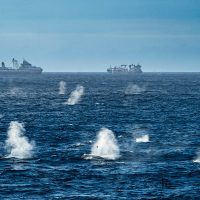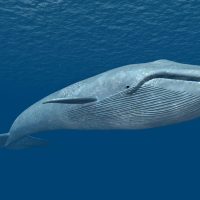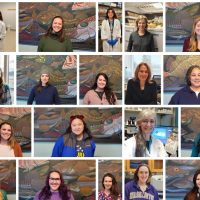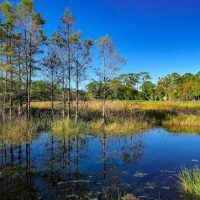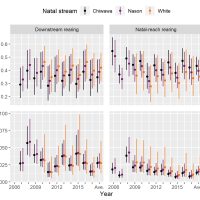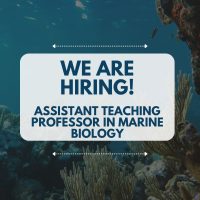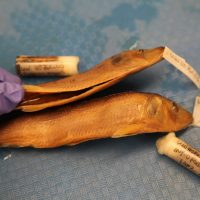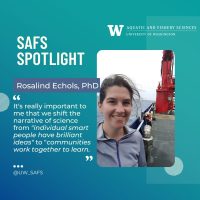Filter Results
Skating on thin ice: polar bears in a warming future
On International Polar Bear Day, the plight of these apex predators could not be more evident, as a result of a myriad of threats to their existence due to climate change.
As their name suggests, polar bears live in the Arctic polar regions of Canada, Greenland, Russia and Alaska. Kristin Laidre, a UW scientist at SAFS, shares that polar bears require ice for almost every aspect of their existence, including feeding, moving, breeding and in some places, maternity denning.
Trawlers working amidst a whale ‘supergroup’ raise red flag about human-whale conflicts in a changing ocean
In a study led by Stanford University and Lindblad Expeditions, and co-authored by Trevor Branch from SAFS, scientists observed close to 1,000 fin whales foraging near Antarctica, while fishing vessels trawled for krill in their midst.
Read moreThe giants of the sea
The biggest animals to have ever lived on our planet, blue whales are a charismatic species found across the world’s oceans.
Ranging in size from 79 ft in the Indian Ocean’s pygmy blue whale subspecies to more than 100 ft in Antarctic blue whales, these marine mammals were once hunted to near extinction.
In order to reconstruct past level of whales and discover if blue whale populations were recovering or not after the banning of commercial whaling in the 1980s, scientists have developed models that explain both old whaling catch records and modern-day counts.
I am a woman in science
From salmon ecologists and scientific divers to conservation geneticists and marine biologists, the halls of UW’s School of Aquatic and Fishery Sciences and Marine Biology are filled with women in science.
Some are just beginning their journey with undergraduate degrees while others are pursuing research as retired professors, and we’re celebrating them all and the diversity among them.
For the UN International Day of Women and Girls in Science, we share thoughts from more than 20 women, about their inspirations, the barriers they’ve overcome, and tips for being women in science.
UW Aquatic Sciences Open House is back on May 21
The Open House offers a free and family-friendly afternoon of hands-on learning to celebrate science and research that relates to water.
Read moreWet, wet, wet: celebrating World Wetlands Day
Some of the most biologically diverse ecosystems found on our planet, wetlands are filled with unique plant life and organisms that contribute to the ecological health of the surrounding environment.
An area which is saturated or flooded with water, the distinction of a wetland is the aquatic vegetation which has adapted to thrive in these permanently saturated soils.
Understanding, managing and protecting wetlands has been some of the impetus behind a new Freshwater Minor announced at the School of Aquatic and Fisheries Sciences (SAFS).
New research shows how this chinook salmon life history variability can drive population dynamics
Differences in the life history pathways (LHPs) of juvenile animals are often associated with differences in demographic rates in later life stages. For migratory animals, different LHPs often result in animals from the same population occupying distinct habitats subjected to different environmental drivers.
Read moreWe are hiring! Assistant Teaching Professor in Marine Biology
The University of Washington School of Aquatic and Fishery Sciences and the School of Oceanography invite applications for a full-time (100% FTE), 9-month, non-tenured faculty position at the level of Assistant or Associate Teaching Professor in the broad field of marine sciences. Primary teaching responsibilities will be in the Marine Biology program at the University of Washington field station, Friday Harbor Laboratories (FHL).
Read moreWarming oceans have decimated marine parasites — but that’s not a good thing
More than a century of preserved fish specimens offer a rare glimpse into long-term trends in parasite populations. New research from the University of Washington with lead author Chelesea Wood from SAFS, shows that fish parasites plummeted from 1880 to 2019, a 140-year stretch when Puget Sound — their habitat and the second largest estuary in the mainland U.S. — warmed significantly.
Read moreEngaging a new generation of young scientists: SAFS Spotlight with Rosalind Echols
We spoke with Rosalind Echols, who gained her PhD from the School of Oceanography in Spring 2022 and is now pursuing her Postdoctoral Scholar studies at SAFS, as part of our Spotlight Series. Our Spotlight Series showcases the researchers at SAFS, how they got here, and the impact their research is having on the wider world.
Combining research with academic outreach, Rosalind pulls from her teaching background to engage a new generation of young scientists through the lens of “communities work together to learn”.
